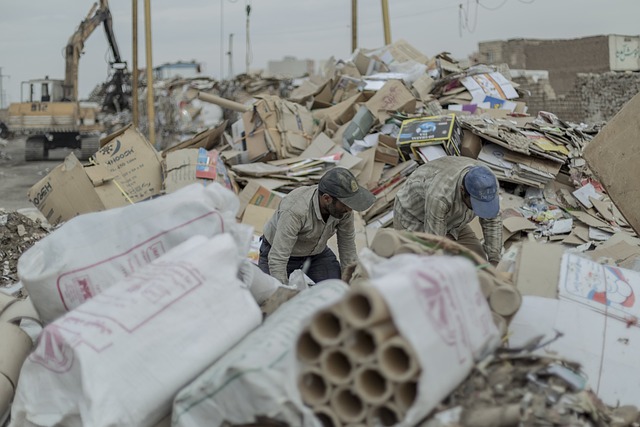Yard waste is a significant contributor to municipal solid waste and environmental degradation, but composting and recycling offer sustainable alternatives. By transforming organic waste into nutrient-rich compost, communities can promote healthier lawns and gardens while reducing landfill waste. Simple practices like leaving grass clippings as mulch or using leaf blowers sparingly further minimize environmental impact. Effective strategies include separating organic materials for composting, using chippers for mulch, and participating in community programs. Community initiatives and innovative technologies drive global efforts to reduce organic waste production, offering long-term cost savings and ecological benefits.
In today’s eco-conscious world, responsible yard maintenance is a vital part of sustainable living. This article explores the impact of yard waste removal and recycling, offering insights into effective strategies for both homeowners and communities. We delve into the environmental consequences of traditional practices, highlighting the importance of adopting green alternatives. From composting techniques to community initiatives, discover how everyone can contribute to a greener future while caring for their yards responsibly.
- Understanding Yard Waste Impact and Sustainable Alternatives
- Effective Strategies for Composting and Recycling Yard Waste
- Community Initiatives and Future Trends in Sustainable Yard Care
Understanding Yard Waste Impact and Sustainable Alternatives

In many communities, yard waste makes up a significant portion of total municipal solid waste. This includes organic materials like grass clippings, leaves, and branches that often end up in landfills, contributing to methane emissions and environmental degradation. Understanding the impact of yard waste is crucial for adopting more sustainable practices. Instead of traditional Yard Waste Removal methods, exploring recycling options can significantly reduce this environmental footprint. Composting, for instance, transforms organic yard waste into nutrient-rich soil amendments, promoting healthier lawns and gardens while diverting waste from landfills.
Sustainable alternatives to conventional Yard Waste Management offer multiple benefits. They not only minimize greenhouse gas emissions but also conserve natural resources by reducing the need for chemical fertilizers and pesticides. By implementing simple changes, such as leaving grass clippings on the ground as a natural mulch or using leaf blowers sparingly, individuals can contribute to a greener and more eco-friendly environment. These practices promote a harmonious relationship between outdoor spaces and their ecological context, ensuring a healthier planet for future generations.
Effective Strategies for Composting and Recycling Yard Waste

Effective strategies for composting and recycling yard waste not only reduce the amount sent to landfills but also create valuable resources for your garden. Start by separating organic materials like leaves, grass clippings, and food scraps into a dedicated compost pile or bin. This process allows for decomposition, transforming waste into nutrient-rich compost that can enhance soil structure and fertility. Aim for a balance of green (nitrogen-rich) and brown (carbon-rich) materials to speed up the composting process.
For recycling yard waste, consider using chippers or shredders to transform larger items like branches and leaves into mulch or wood chips. These materials can be used as a natural ground cover, suppressing weeds and retaining moisture in the soil. Additionally, many communities offer yard waste removal programs, allowing you to set out specific containers for collection and recycling. By adopting these practices, you actively contribute to sustainable yard maintenance, minimizing environmental impact while promoting a healthier ecosystem.
Community Initiatives and Future Trends in Sustainable Yard Care

Community initiatives are playing a pivotal role in promoting sustainable yard care practices. Local neighborhoods and cities across the globe are embracing eco-friendly solutions, such as implementing shared garden spaces and community composting programs. These efforts reduce the reliance on individual yards for waste production by providing alternative means to manage organic materials. For instance, residents can drop off food scraps and yard trimmings at centralized composting sites, minimizing the need for frequent curb-side pickups and reducing carbon emissions from transportation.
Looking ahead, future trends in sustainable yard care promise even more innovative approaches. Advanced technologies like smart sensors and apps are being developed to optimize watering schedules, ensuring efficient use of water resources. Additionally, the integration of renewable energy sources into landscaping design is gaining traction, with solar-powered lawnmowers and lighting systems becoming more accessible. These innovations not only contribute to environmental sustainability but also offer long-term cost savings for homeowners and community associations alike. The focus on Yard Waste Removal and Recycling remains a key driver in this evolving landscape, as communities strive to minimize waste and maximize resource conservation.
By adopting sustainable practices, such as composting and recycling yard waste, we can significantly reduce environmental impact and foster healthier ecosystems. Community initiatives and innovative trends further emphasize the importance of responsible yard care. Effective strategies outlined in this article serve as a roadmap for individuals to make positive changes, ensuring a greener and more resilient future for our communities and the environment. Remember, small actions in our backyards can lead to substantial positive outcomes globally, making yard maintenance an essential component of sustainability efforts.
